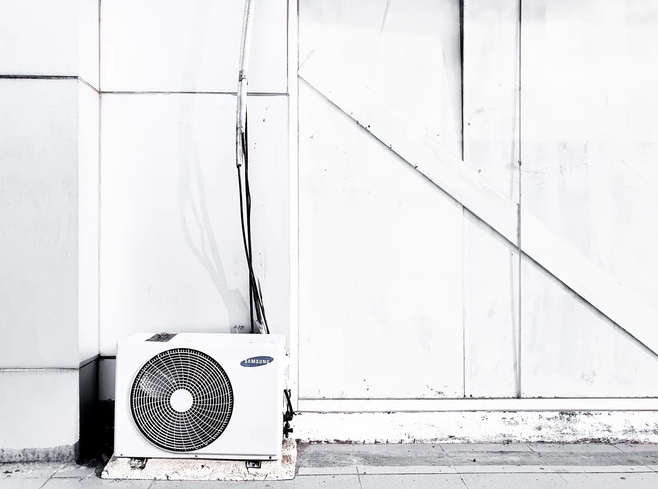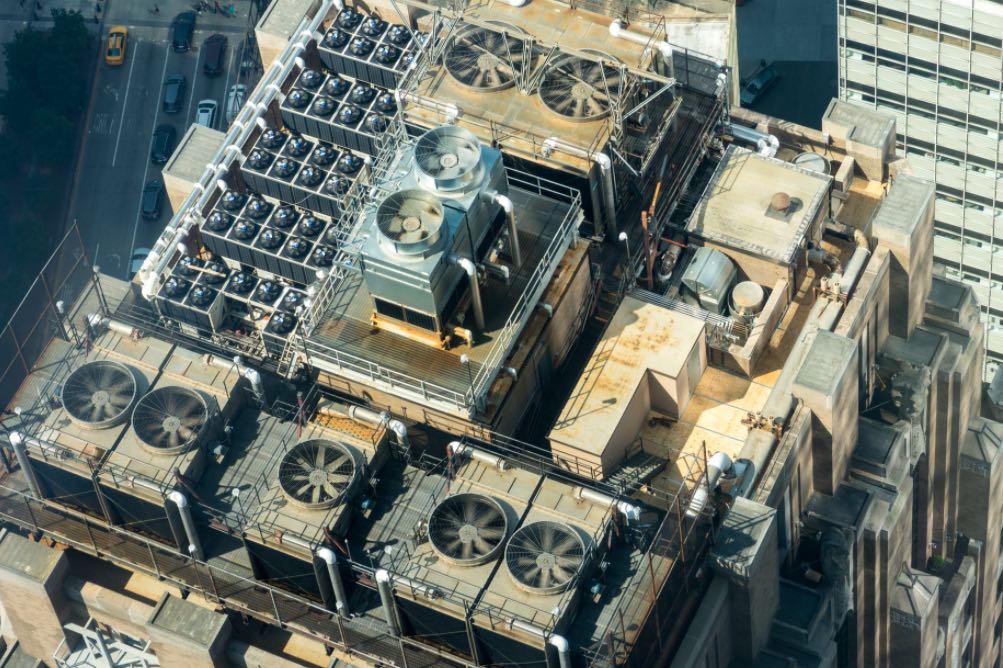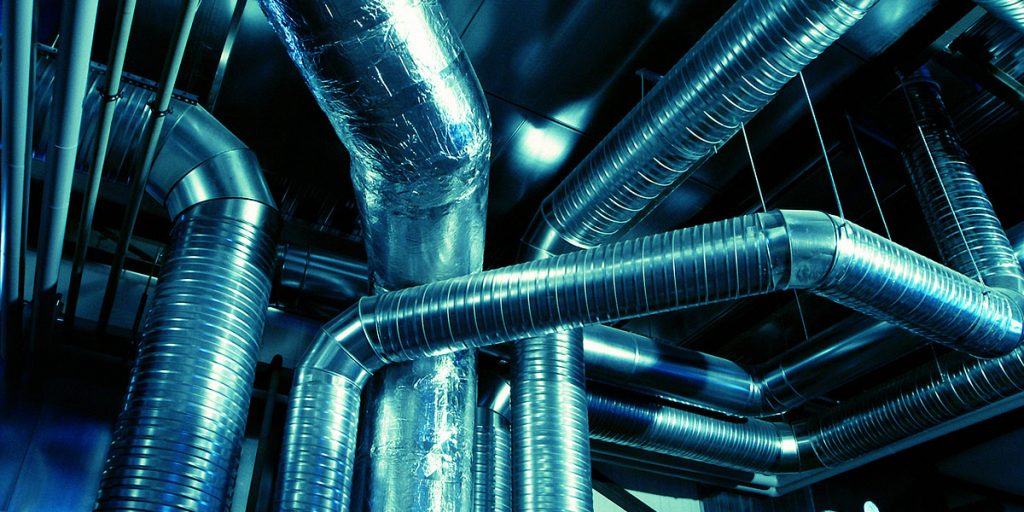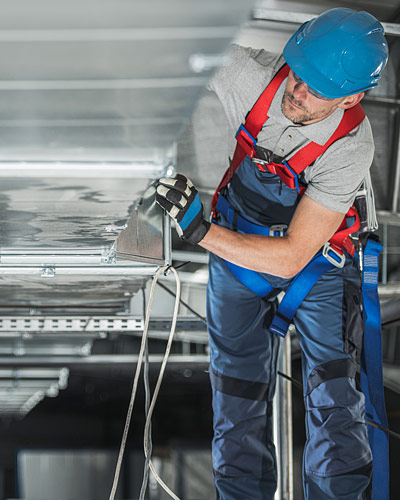Your HVAC system runs year-round, day and night. At that pace, it won’t last forever. The average lifespan of an air conditioner is about 12 to 15 years, and furnaces usually last about 20. So if you stay in one home for long enough, system replacement is inevitable.
It’s also one of the more expensive home maintenance tasks you’re likely to face as a homeowner, so you’re going to want to delay that inevitability as long as possible. And since replacing a broken HVAC system isn’t one of those jobs you can put off until a rainy day, it’s important to have a plan to replace your system before it breaks down for good.
When it comes to overall building maintenance procedures, implementing a specific plan for your commercial HVAC system can extend the life of your unit and save money in the long run. In addition, having an efficient, well-run HVAC system from the start can help you avoid headaches down the road.

Heating and air conditioning systems play an important role in every commercial property. However, as the HVAC equipment is running around the clock to maintain a comfortable working environment for employees, it costs a lot in energy bills to operate in your average workplace, and that’s before you even consider the cost of maintenance, repairs, and eventually replacements.
The lifespan of HVAC equipment can vary significantly depending on how well maintained they are. With regular maintenance, you can extend the lifespan of the equipment, often getting as much as 10-20 years from the system if cared for properly. This means you can save a significant amount of money by taking the time to maintain the system, which is a lot easier than most assume.
Air conditioning systems in a commercial environment are crucial for keeping employees comfortable and productive. Computer equipment and other machinery need regulated temperatures to operate efficiently as well. Therefore, it makes good business sense to find ways to ensure your commercial air conditioning system is kept in top running condition. This will extend the life of your HVAC and prevent you from having to invest in a replacement prematurely.
Extending HVAC Lifespan
If you’re good with your HVAC system, it will be good for you. It’s not unheard of for air conditioners and furnaces to last for many years beyond their average lifespans. But even a long system life can come with its own costs.
As your equipment ages, it will suffer reduced energy efficiency even if it’s well cared for. This will cause your utility bills to creep up gradually. And individual parts will all meet their maker at some point, so you’re likely to spend more on emergency repairs once your system reaches its golden years.
What’s more, while your system is giving you all those years of great service, HVAC technology is always on the march. So by the time you’re ready for replacement, the latest HVAC systems will inevitably be more efficient than your old system was when it was brand new —, and the difference could be significant.
Schedule Regular Maintenance
Something that should be a regular item on the books of a property management team or building manager is regularly having commercial HVAC systems checked for maintenance. This can help identify small issues before these become major problems and cut down on expensive emergency repairs. In addition, general maintenance can be great to schedule between seasons when filters may need replacing for maximum efficiency. Check out HVAC Breakdown and Repairs Services page which has everything you might need near you.
When performing a system check, you want to check two main things: your thermostat and the drip pan and drain lines. Double-check that the thermostat is functioning to prevent costly bills, and check the drip pan and drain lines to ensure that they are clear of clogs. Clogs can cause moisture to build up in the system, encouraging the growth of mould and mildew. System checks should be performed monthly.
Regularly Inspect and Clean Filters
Filters in the AC and heat pump need to be regularly cleaned every 1-3 months, so always ensure that they are properly cleaned.
Though your HVAC technician should check your filters during your twice-annual checkups, this task is really up to the homeowner. Most homeowners use disposable 30-day fibreglass filters or 3-month pleated filters, and these should be checked regularly. If they’re seriously dirty, they should be replaced, even if it’s ahead of schedule.
A dirty air filter means that your HVAC system has to work harder to circulate air throughout your home. This can be especially taxing on the fan, but the whole system can suffer when it can barely breathe.
Take the time to inspect them for damage while cleaning, too, as a broken filter will have an adverse effect on the entire HVAC system, so it could seriously shorten its lifespan if left unchecked.
Exterior commercial HVAC units outside of buildings sometimes can go to the wayside for ongoing maintenance and upkeep. Delegating this task to maintenance professionals or landscapers can be a simple way to ensure that exterior units are monitored, kept clean, and clear throughout the year. If any rusting or damage is noted, this can be reported to the building manager so that external commercial HVAC systems and condensers are serviced and can be quickly fixed when damaged.
You want to remove all dirt, debris, and dust from the filter; otherwise, the system isn’t as efficient at removing airborne particles while potentially damaging other parts of the equipment and causing it to fail.
Check Over the Heating Components

You’ll want to check over various heating components, as they can pose a serious fire hazard if not properly in place – nothing shortens the lifespan of an HVAC system like it catching fire. But, more importantly, this can pose a serious health risk to employees, so don’t overlook this!
Check the connections for the gas/oil components of the equipment, along with the gas pressure, heat exchanger, and burner combustion. Make sure all connections are safely in place and there are no cracks or other signs of damage, while it’s a good idea to clean the burner too.
Make sure you complete this maintenance before turning the heating on.
Use the “auto” fan setting. Looking for Commercial HVAC Melbourne? Look no further, Outline Air Melbourne has you covered.
Most HVAC systems have two fan settings: “auto” instructs the fan to run only when the system is actively heating or cooling, and “on” instructs the fan to run constantly. In addition, some systems have dual-speed fans, which allow for a slower, more energy-efficient fan setting between heating and cooling cycles.
There are benefits to using the “on” setting. It helps trap more dust, and in homes with people who have respiratory sensitivities or allergies, it can help make it easier to breathe. But the major disadvantage is that it forces the system to work much harder, which shaves time off of its life. It also leads to filters that clog up faster, so you could really be taxing your system if you don’t change them regularly.
Clean Around the Condenser
Always make sure to regularly clean around the condensing unit, which is susceptible to blockages from loose debris because it is outdoors. Inspect it for signs of damage, too, as the elements can often cause damage that will lead to more serious issues down the line, which can get even worse if left unchecked.
Your air conditioner’s condenser is somewhere outside your home, which is built to stand up to the elements. It can, however, become damaged from hail or windblown debris from severe storms. So every once in a while, and especially after every major storm, look over your condenser for signs of damage
While you’re at it, be sure to clear away any accumulation of leaves or weeds on or around the condenser. If vegetation is growing right next to the unit, cut it down. Your condenser needs room to breathe, too.
Also, give the unit a good clean and cut back any nearby growth, as it requires breathing space, so it may not work as efficiently if there is too much foliage nearby.
Get A Smart Thermostat
The latest thermostat technology, smart thermostats, are easy to program and control from anywhere using your smartphone or tablet. Some models can even learn your HVAC habits and schedule so they can make energy-saving adjustments without any programming at all.
When it’s easier to micromanage your thermostat settings, it’s easier to use your system less. And that will make it last longer.
Arrange for Annual HVAC Inspection
While you can conduct a lot of maintenance yourself, it’s always recommended that you arrange for at least one annual HVAC inspection. By letting a professional check over all the equipment, you’ll sooner spot any small issues that can have a more significant impact on the performance and durability of the system.
Southwest Mechanical is a full-service mechanical contractor that provides services in Los Angeles County for all aspects of commercial property services. We offer a wide range of mechanical services for all projects. Headquartered in Southern California, Southwest’s professional staff and tradespeople deliver a full range of serves for Heating, Ventilation, and Air Conditioning (HVAC), plumbing, boiler hot water, general contracting, electrical, concrete, roofing, waterproofing, waste management, energy management, and consulting.
Seal Windows and Doors
An efficient way to keep your buildings cool in the summer and warm in the winter is to block out external elements as much as possible. For example, suppose your commercial space is in an older, drafty building. In that case, it might be time to have upgrades made to windows and doors, so they are more energy-efficient and can keep interior spaces temperate, no matter the weather outside. These improvements could be as simple as sealing existing window and door frames with weather stripping or as major as an entire overhaul of existing windows and doors to bolster overall efficiency.
Heating and Cooling Alternatives
The more you can do to help practice alternative heating and cooling options throughout a large building or space, the better. This might involve incorporating fans and cooling systems with a fan option instead of only ‘off’ and ‘AC’ usage. Invest in industrial screens that are tamper-resistant or adding stoppers on windows. This will allow individuals to open windows for airflow without compromising building safety. Invest in heavy blinds or curtains that can seal in heat when you need this, so you don’t need to rely on your heating system as much.
Focus on Spaces in Use
If you own a large commercial space or have an office with many vacant rooms, consider what areas need to be cooled and heated and what might not. In the winter months, having doors that automatically shut and keeping doors connecting to larger lobbies and hallways closed will keep heat where it needs to be. Ultimately, you’ll rely on your HVAC system less. Make sure your commercial HVAC system is on a timer and have this checked and serviced regularly. This way, your building won’t be working overtime to cool or heat itself when no one is around, including long weekends and holidays.
Be Aware Of Any Changes
As your HVAC system runs most of the time, you’ll be used to how it sounds and operates. Pay attention and if you notice any changes in its usual noises, efficiency, or the amount on your energy bill, don’t dismiss it as your over-active imagination, but rather have it checked out. Any change—big or small—in how the system runs is usually a sign of a bigger issue that will need to be inspected.
Upgrade Your Insulation

The less often your HVAC system runs, the longer it will last. And in the struggle to keep your treated air inside your home, insulation is your best friend.
The most important place to check for sufficient insulation is in your attic. The amount and type you need vary by region, so check the Environmental Protection Agency’s insulation climate map and guidelines for insulation upgrades.
If you have insufficient insulation throughout your home, it may also be worthwhile to insulate your basement or add more insulation into wall cavities. The best way to locate and evaluate your weak insulation spots is to schedule a professional energy audit.
Get A Smart Thermostat
The latest in thermostat technology, smart thermostats, are easy to program and control from anywhere using your smartphone or tablet. Some models can even learn your HVAC habits and schedule so they can make energy-saving adjustments without any programming at all.
When it’s easier to micromanage your thermostat settings, it’s easier to use your system less. And that will make it last longer. Take other steps to ease the burden on your system.
Don’t stop with just the smart thermostat; give your system a break by using your ceiling fans during hot weather to stay cool while pushing the temperature a little higher. Also, invest in reflective shades to block out unwanted heat from the sun.
Then, in winter, throw those shades open to let the free heat pour in, and use sweaters, blankets and space heaters to stay comfortable while setting the thermostat a little lower.
How Do You Know When To Replace Your HVAC System?
Taking care of your HVAC system will make it last beyond normal expectations, but sooner or later, you will need to invest in a new one. The biggest indicator of the end of an HVAC unit’s lifespan is a drastic increase in the frequency and cost of repairs. Your Art Plumbing, AC & Electric technicians will be able to advise you at what point it will be more cost-effective to replace instead of repair. Check out our range of Domestic Air Conditioning Melbourne to help with your problem.

